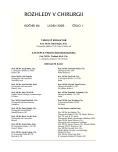-
Medical journals
- Career
Could the Peroperative Manometry of the Oesophagus Be Used for Prediction of Dysphagia Following Antireflux Procedures?
Authors: V. Procházka; Z. Kala; R. Kroupa 1; P. Kysela; L. Izakovičová Hollá 2; Jiří Dolina 1
Authors‘ workplace: Chirurgická klinika FN Brno-Bohunice, přednosta prof. MUDr. J. Vomela, CSc. ; III. interní gastroenterologická klinika FN Brno-Bohunice 1; Ústav patologické fyziologie LF MU Brno 2
Published in: Rozhl. Chir., 2005, roč. 84, č. 1, s. 7-12.
Category: Monothematic special - Original
Overview
A possible development of the postoperative persisting dysphagia, which decreases the quality of life of the operated, remains the main drawback of the laparoscopic antireflux surgery. Among several variations of the antireflux surgical procedures, there is none known to completely eliminate this risk. In this study, supported by the IGA MZ ČR ND 7142-3 grant, peroperative measurements of the lower oesophageal sphincter (LES) tone with a concurrent mechanical callibration of the cuff using an oesophageal tube were taken. A complete Nissen-Rossetti cuff was applied in 39 patients. Peroperative increases in the LES tone following the completion of the antireflux cuffs were monitored. The patients continued to be monitored with the aim to detect the onset of dysphagia. In the patient group with the peroperative LES tone increase exceeding 15 mmHg, significantly higher rates of prolonged dysphagia were recorded. In cases of lower LES increases, the rates of dysphagia were low and good functioning to prevent any pathological gastrooesophageal reflux was maintained. No complication with respect to the peroperative oesophageal manometry was recorded. Duration of the antireflux operation conducted with the peroperative manometry was prolonged by 4 minutes, on average. Based on the assessment of the data, the authors demonstrate that the LES tone increase on its own, does not provide for the antireflux efect of the fundoplication procedures and that the patients cannot benefit from its extremely high values. On the contrary, its high values may indicate possible risks of dysphagia in the postoperative period.
Key words:
reflux – fundoplication – laparoscopy – dysphagia – manometry
Labels
Surgery Orthopaedics Trauma surgery
Article was published inPerspectives in Surgery

2005 Issue 1-
All articles in this issue
- Tension Gastrothorax as a Late Consequence of an Undiagnosed Rupture of the Diaphragm
- Could the Peroperative Manometry of the Oesophagus Be Used for Prediction of Dysphagia Following Antireflux Procedures?
- Injuries to the Biliary Tract during Cholecystectomy
- Surgical Treatment of Distally Located Rectal Carcinomas Using the Rendez-vous Method – a Laparoscopic Resection in Combination with T.E.M
- Anatomical Resection for Liver Metastases of the Carcinoma of the Large Intestine and the Rectum
- The Cystadenocarcinoma of the Appendix
- Hemipelvectomy for a Desmoidal Tumor
- A Case of an Asynchronic Triple Tumorous Disorder: a Rectal Adenocarcinoma, a Carcinoma of the Kidney and a Prostatic Adenocarcinoma. A Case-review
- Reconstruction Surgical Procedures for Iatrogenic Injuries to the Urether. Examples of Uncommon, However Successful Approaches to their Management
- Perspectives in Surgery
- Journal archive
- Current issue
- Online only
- About the journal
Most read in this issue- Injuries to the Biliary Tract during Cholecystectomy
- Hemipelvectomy for a Desmoidal Tumor
- Anatomical Resection for Liver Metastases of the Carcinoma of the Large Intestine and the Rectum
- The Cystadenocarcinoma of the Appendix
Login#ADS_BOTTOM_SCRIPTS#Forgotten passwordEnter the email address that you registered with. We will send you instructions on how to set a new password.
- Career

